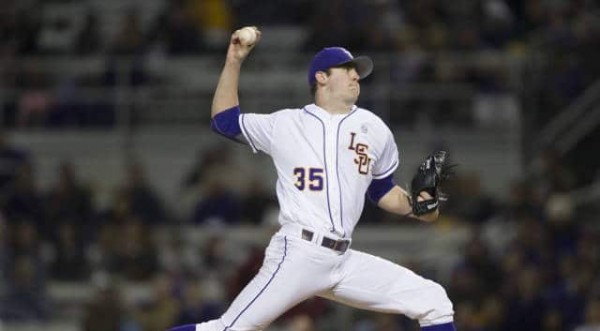Last week, I was surprised to hear Eugene Emeralds’ TV Broadcaster Matt Dompe say that Cubs’ first round pick Alex Lange would be going ten innings this year for Eugene. The main reason was that Lange had already thrown 124.1 IP for LSU this spring. I thought for sure Lange would go the Thomas Hatch route this year by just hanging out with a team and getting used to the daily routine of the MiLB life. I did not think he would throw a pitch.
When the Cubs drafted him, I really liked the selection. I liked Lange’s experience, his competitiveness, and his two plus pitches: a 12-6 hammer curve and a low 90s FB with excellent command. I thought that with his pedigree, he could get to the majors quickly. He still can.
It was clear from the beginning in his debut on Friday night that Alex Lange is too good for short season A ball. He pitched 2 innings, throwing 22 pitches, 15 for strikes. He was a bit wild in the first inning, but he relaxed and was said to look comfortable in the second. His fastball sat between 89-93. His curveball was “as advertised” according to Emeralds radio announce Pat Zajak. He struck out three of the six batters he faced. He also coaxed two groundball outs and a pop out.
Thought it was very encouraging, be careful about putting too much stock in this one performance. He faced six batters aged 18, 18, 19, 20, 21, and 22. He should dominate them with his experience and his arsenal. He struck out two of his victims with his plus curve. For instance, opposing outfielder Chad Smith was caught looking at a bender and started heading back to the dugout before the umpire could call him out.
In six more days, Lange will make another brief start. I would rather it would be in South Bend.
Lead photo courtesy Kyle Zedaker—LSU Sports

“He faced six batters aged 18, 18, 19, 20, 21, and 22. He should dominate them with his experience and his arsenal.”
To be fair he is also 21 and he faced 6 hitters good enough to get a pro contract. He probably never face 6 hitters good enough to get a pro contract in any line-up he faced in college and some of those line-ups had zero players good enough to get a pro contract.
The low minors are a big step up from college ball.
He’s pitched in the SEC for 3 years. Those teams are filled with players who go pro.